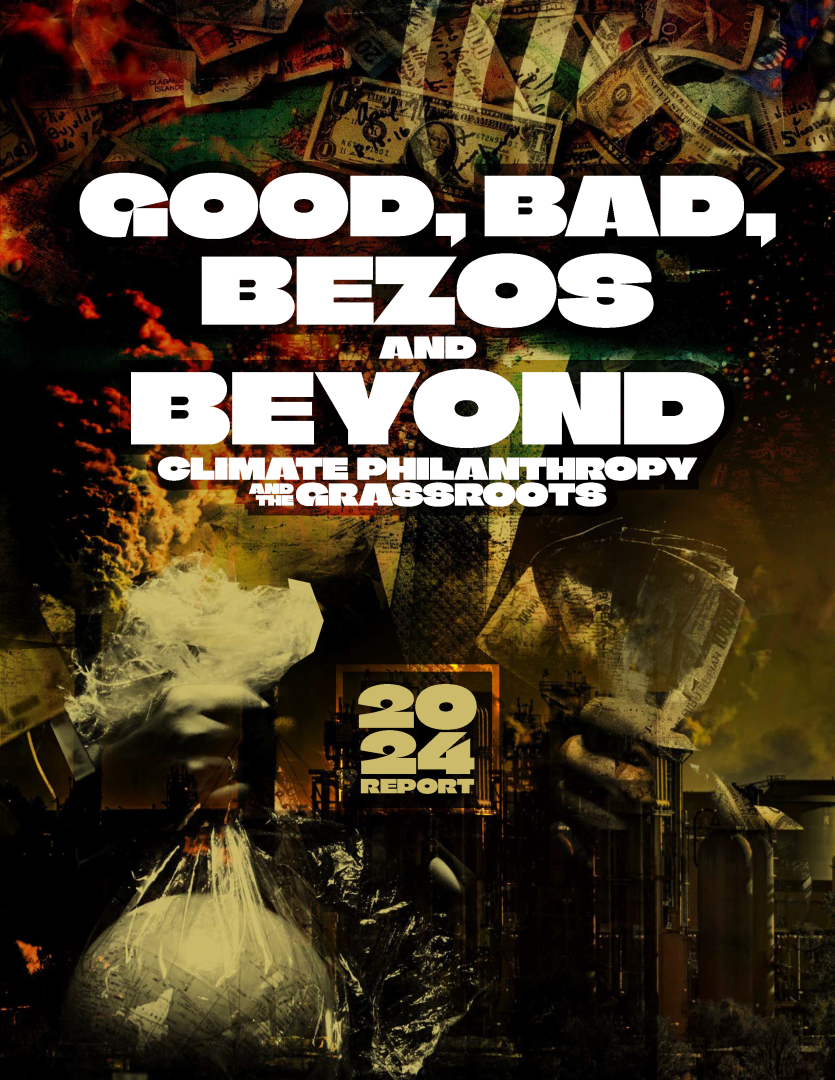CONTACT (S): Russell Roybal rroybal@ncrp.org
Jennifer Amuzie, jamuzie@ncrp.org
NCRP Showcases Community-led Effort to Hold
Billionaire Climate Funders Accountable to Frontlines
“Good, Bad, Bezos, and Beyond” tells the story of how communities can respond to
billionaire climate funding models that under–resource impacted communities and movement groups
WASHINGTON, DC – As the world commemorates Earth Day this week, the latest report by the National Committee for Responsive Philanthropy (NCRP) offers an important case study in how power-building intermediaries are mobilizing to hold billionaire climate solutions accountable to impacted communities.
Co-published with the Regenerative Economies Organizing Collaborative (REO), Good, Bad, Bezos and Beyond: Climate Philanthropy and the Grassroots aims to shed light on the complexities of climate funding, particularly in the context of initiatives like the Bezos Earth Fund (BEF). The report details the unprecedented movement organizing that went on in the wake of the Bezos Earth Fund announcement in 2020, explores some history of philanthropy’s relationship to grassroots funding, and identifies some of the attempted early shifts in responding to the rise in billionaire climate philanthropy.
Recommendations include a powerful call to action for grantmakers to make bold and meaningful investments in grassroots leaders, organizations, and solutions.
“This report helps answer a frequent, but simple question – how can philanthropy navigate its role in addressing the climate crisis while ensuring equity, justice, and community empowerment?” says NCRP VP & Chief External Affairs Officer, Russell Roybal. “By examining past efforts, highlighting grassroots interventions, and presenting actionable pathways, this report invites funders and activists to critically engage with the dynamics of climate philanthropy and its effect on impacted communities.”
The report was written by writer and philanthropic consultant Jennifer Near and designed by artist Darius Wilmore, in collaboration with NCRP and REO.
IMPORTANT LESSONS FOR PHILANTHROPY
Good, Bad, Bezos and Beyond: Climate Philanthropy and the Grassroots focuses on how climate justice leaders and allies mobilized quickly to resource frontline needs. The report also describes how collaboration among stakeholders led to the formation of the Fund for Frontline Power (F4FP) as a grassroots-led vehicle for supporting community-based, equitable climate solutions.
The organizing effort after the initial BEF announcement moved $141 million into grassroots-accountable intermediaries which represent over 500 grantee partners. While this doubled U.S. climate philanthropy for equity via intermediary funds, it was only a fraction of the cumulative $500 million in grants that five already disproportionately resourced, predominantly white–led, Big Green organizations directly received.
The examination in community action and intermediary power building and sharing has strong implications for funders’ future organizing in partnership with movement leaders. Jacqui Patterson, organizer leader of the Chisholm Legacy Project and a TIME 100 Person of the Year, sees a lot of important lessons in the report.
“One must only look at the annual reports/impact statements of The Hive Fund, The Solutions Project, NDN Collective, and other recipients of the Earth Fund to see the proof of concept that when we resource the frontlines, we all win!” says Patterson. “Through facilitation by the Climate Justice Alliance, these groups were able to utilize these resources with the blessing and collaboration with worker groups such as Athena that comprise some of the very Amazon workers who are being egregiously harmed in the production of the profits that wrought this funding.”
CENTERING FUNDING DECISIONS ON COMMUNITY EXPERTISE
Patterson applauds setting a sunset for the the inception of a fund, agreeing that more funders should recognize that “waiting until a rainy day to spend is a bit antithetical to the fact that we are currently in a deluge, literally and figuratively.” She also applauds the “willingness to break away from the formulas mired in the old unproven ways of philanthropy that have system scale transformations on environmental and climate justice hampered by lack of investment.”
“Ultimately, we need all funders and donors to take more bold actions and release control of philanthropic resources as well take a consultative stance at the outset, rather than forcing grassroots leaders to intervene,” adds Patterson. “This is a lesson in what’s needed in terms of frontline organizations speaking truth to power unapologetically, and philanthropy paying heed and following the lead of the frontlines!”
Good, Bad, Bezos and Beyond is part of a multi-year NCRP campaign encouraging grantmakers to prioritize a just transition away from an extractive to a regenerative economy that invests in frontline community power, redistributes resources equitably, and upholds deep democracy and self-determination. The report is just the latest example of how, working with funders and non-profits, NCRP researchers and organizers amplify intersectional efforts that are leading the shift away from false solutions and toward community-centered, grassroots projects.
“Without much public fanfare or resources, frontline organizations and organized impacted communities are finding some success in building community resilience and pushing back against some of the worst impacts of climate crisis,” says NCRP’s Movement Engagement Manager for Climate Justice Senowa Mize-Fox.
ABOUT NCRP
The National Committee for Responsive Philanthropy (NCRP) has served as philanthropy’s critical friend and independent watchdog since 1976. We work with foundations, non-profits, social justice movements and other leaders to ensure that the sector is transparent with, and accountable to, those with the least wealth, power and opportunity in American society.
Our storytelling, advocacy, and research efforts, in partnership with grantees, help funders fulfill their moral and practical duty to build, share, and wield economic resources and power to serve public purposes in pursuit of justice.
ABOUT THE REGENERATIVE ECONOMIES ORGANIZING COLLABORATIVE (REO)
The Regenerative Economies Organizing Collaborative (REO) is a group of domestic and international funders working to shift philanthropy to support locally-rooted Black, brown, Indigenous and working class-led movements through political education, peer-to-peer-organizing, joint action and collective thought pieces, calling in philanthropic colleagues toward accountability, transparency and solidarity with frontline communities.


Leave a Reply